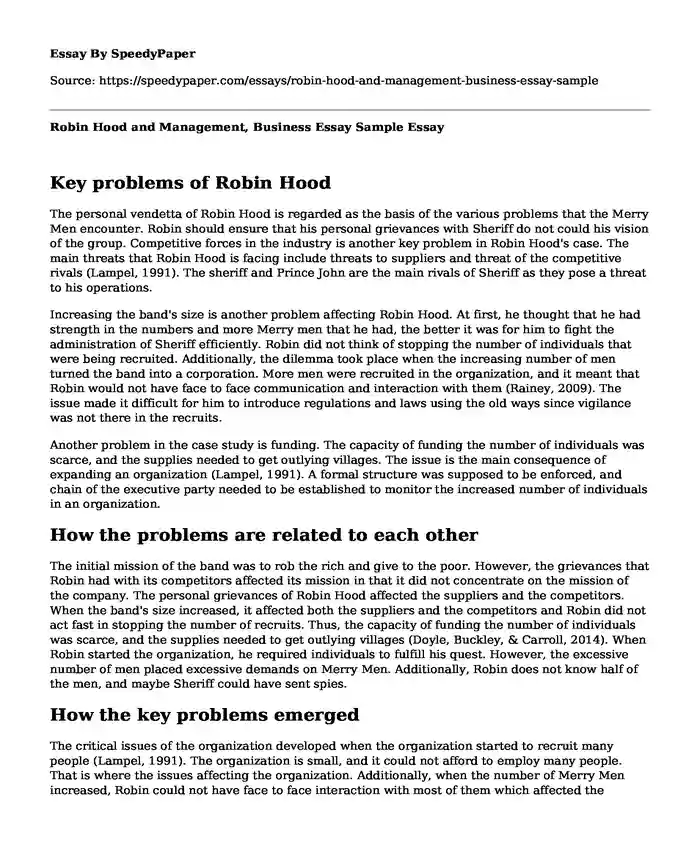
| Type of paper: | Case study |
| Categories: | Management Business |
| Pages: | 3 |
| Wordcount: | 648 words |
Key problems of Robin Hood
The personal vendetta of Robin Hood is regarded as the basis of the various problems that the Merry Men encounter. Robin should ensure that his personal grievances with Sheriff do not could his vision of the group. Competitive forces in the industry is another key problem in Robin Hood's case. The main threats that Robin Hood is facing include threats to suppliers and threat of the competitive rivals (Lampel, 1991). The sheriff and Prince John are the main rivals of Sheriff as they pose a threat to his operations.
Increasing the band's size is another problem affecting Robin Hood. At first, he thought that he had strength in the numbers and more Merry men that he had, the better it was for him to fight the administration of Sheriff efficiently. Robin did not think of stopping the number of individuals that were being recruited. Additionally, the dilemma took place when the increasing number of men turned the band into a corporation. More men were recruited in the organization, and it meant that Robin would not have face to face communication and interaction with them (Rainey, 2009). The issue made it difficult for him to introduce regulations and laws using the old ways since vigilance was not there in the recruits.
Another problem in the case study is funding. The capacity of funding the number of individuals was scarce, and the supplies needed to get outlying villages. The issue is the main consequence of expanding an organization (Lampel, 1991). A formal structure was supposed to be enforced, and chain of the executive party needed to be established to monitor the increased number of individuals in an organization.
How the problems are related to each other
The initial mission of the band was to rob the rich and give to the poor. However, the grievances that Robin had with its competitors affected its mission in that it did not concentrate on the mission of the company. The personal grievances of Robin Hood affected the suppliers and the competitors. When the band's size increased, it affected both the suppliers and the competitors and Robin did not act fast in stopping the number of recruits. Thus, the capacity of funding the number of individuals was scarce, and the supplies needed to get outlying villages (Doyle, Buckley, & Carroll, 2014). When Robin started the organization, he required individuals to fulfill his quest. However, the excessive number of men placed excessive demands on Merry Men. Additionally, Robin does not know half of the men, and maybe Sheriff could have sent spies.
How the key problems emerged
The critical issues of the organization developed when the organization started to recruit many people (Lampel, 1991). The organization is small, and it could not afford to employ many people. That is where the issues affecting the organization. Additionally, when the number of Merry Men increased, Robin could not have face to face interaction with most of them which affected the operations of the organization and gave the competitors a chance of outshining them.
What Robin should do in short-term and long-term
In the short term, Robin should stop accepting recruits into the organization immediately. It should also start a program that will help in downsizing the band. Robin should use harvest strategy in maximizing the short-term cash flow in making scattered raids outside the Sherwood Forest in shoring sagging revenues (Starling, 2011). The long-term plan for Robin is pursuing negotiations with the barons for securing amnesty for the remaining Merry Men. Another long-term recommendation for Robin is to stop operations soonest to assist the Merry men to get alternative career occupations.
References
Doyle, E., Buckley, P., & Carroll, C. (Eds.). (2014). Innovative business school teaching: Engaging the millennial generation. Routledge.
Lampel, J. (1991). Robin Hood.
Rainey, H. G. (2009). Understanding and managing public organizations. San Francisco, CA: Jossey-Bass.
Starling, G. (2011). Managing the public sector. Belmont, CA: Wadsworth Cengage Learning.
Cite this page
Robin Hood and Management, Business Essay Sample. (2022, Mar 14). Retrieved from https://speedypaper.com/essays/robin-hood-and-management-business-essay-sample
Request Removal
If you are the original author of this essay and no longer wish to have it published on the SpeedyPaper website, please click below to request its removal:
- Paper Example: Video Quality of Service for Video Traffic over the Internet
- Community Service for Graduation, Free Essay in Education
- Essay Sample on Hollywood Throughout American History
- Business Essay Example: Outcomes of the OCAI of Tiffany Oloke
- Financial Dimension in Healthcare, Free Essay for Everyone
- The Birthmark by Nathaniel Hawthorne, Free Essay Example
- Report Example on Economic Growth in Saudi Arabia
Popular categories




